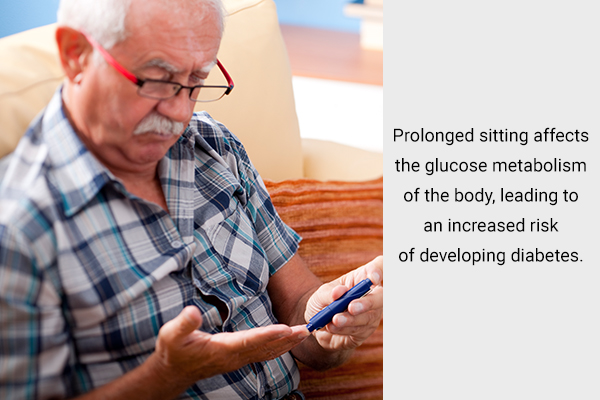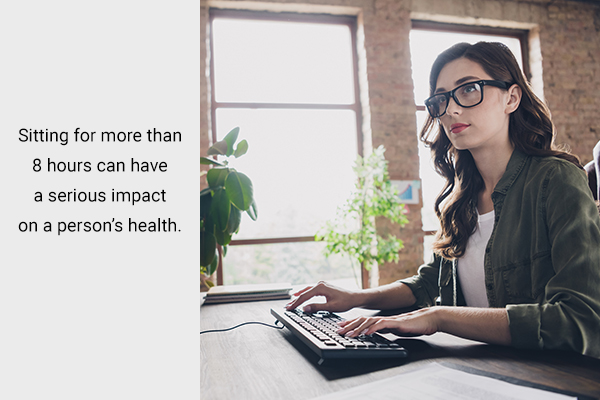In this article:
In recent years, due to changes in lifestyle and work culture, most people spend a lot of time sitting and executing work. But this way of life is not without risks.

Excessive sitting is a risk factor for many health issues. (1) A 2011 study reported in PLOS One established that between 1960 and 2010, there has been a decline in the average energy expenditure of individuals while at work. This, in turn, has led to an increase in obesity rates among young and middle-aged people. (2)
Read on to know more about the health hazards of sitting in one place for long periods.
Trivia: One can be social outside social media, too.
Health Hazards of Sitting for Long Periods
Remaining seated for several hours can lead to the following health disadvantages.
1. Increased risk of diabetes
Prolonged sitting may increase your chances of developing type 2 diabetes. A meta-analysis in 2012 reported that uninterrupted sitting for a long time increased the risk of developing diabetes. (3)
Some other studies indicate brief interruptions to sitting time decrease the risk of diabetes. A study conducted in 2016 on 24 participants demonstrated that interrupting prolonged sitting by bouts of walking or light exercise lowered post-prandial glucose (after a meal) in 39% of the participants. (4)
An earlier study reported in 2010 that a reduction in physical activity and sitting for long periods led to insulin resistance, which ultimately resulted in type 2 diabetes. (5)
2. Increased risk of obesity
Uninterrupted sitting for long periods may also increase your chances of becoming overweight or obese.
Body mass index (BMI) is an indicator of physical health. A higher BMI is associated with a higher chance of becoming obese.
A study published in 2015 concluded that long sitting times increased BMI. (6)
3. Increased risk of cardiovascular disease

Sitting for long periods daily is also associated with higher chances of developing cardiovascular issues. A 2019 study found a 95% increased risk of cardiovascular disease associated with high total daily sitting time. (7)
An earlier study published in 2014 reported an increased incidence of myocardial infarction with increased total sitting time. (8)
4. Increased risk of hypertension
Sitting for long periods causes a lowering of the metabolic rate and slowing down of the rate of blood flow along with a simultaneous elevation of nervous activity. These effects, in turn, cause impaired vascular function, which can lead to hypertension.
Hence, to keep blood pressure under control, the advice is “sit less, move more.” (9)
5. Increased risk of developing certain cancers
Moving less and sitting for prolonged periods lower the metabolic rate, leading to increased deposition of fat. This increase in fat deposition leads to the alteration of hormonal balance in the body.
As a result, there could be an increase in the levels of sex hormones, insulin resistance, chronic inflammation, and other physiological changes. All these factors contribute to increased chances of developing certain types of cancers. (10)
Increased exposure to sex hormones in the body leads to an enhanced risk of developing hormone-related cancers such as breast cancer, uterine cancer, and prostate cancer. (10)
Moreover, prolonged sitting can cause an increase in body fat percentage, which may adversely harm your organs. It also increases your risk of developing kidney cancer, colon cancer, esophageal cancer, etc. (10)
6. Increased risk of developing neurological disorders such as Alzheimer’s disease and Parkinson’s disease

The glucose produced from the food you eat is used as fuel for the brain. Prolonged sitting affects the glucose metabolism of the body, leading to an increased risk of developing diabetes. This, in turn, affects glucose availability to the neurons, leading to cognitive decline and hence an increased risk of developing dementia. (11)(12)
7. Increased risk of mortality
Prolonged sitting time leads to various health problems. These health problems can affect your quality of life and can lead to an increased risk of dying from cancer, heart attack, and stroke. This is referred to as “all-cause mortality.”
A study was conducted using data from the American Cancer Society CPS-II Nutrition Cohort. Out of 127,554 people with no major chronic diseases observed for a period of 21 years, 48,784 people died within the time period of the study. Prolonged sitting (≥6 vs. <3 hours per day) was associated with a higher risk of mortality in all cases. (13)
Doctor Recommendations to Avoid Prolonged Sitting
- Take the stairs and walk-up escalators.
- Stand or walk around while cooking in the kitchen or talking on the phone.
- Place your laptop on a box or similar object to work while standing for at least a little while.
- Plan a visit to your nearest park every Saturday and go there for a walk.
- Use a bicycle more often than your car.
- Watching TV and movies may be good but active hobbies such as gardening and dancing are even better.
Most-Asked Questions About the Ill Effects of Prolonged Sitting on Health
What should be done to overcome the negative effects of prolonged sitting?
To make up for the time you spend sitting at home or at work, you can stand while traveling by train or bus, take the stairs instead of escalators, or take a break every 30 minutes or so and walk around.
What recommendations have been made by the World Health Organization (WHO) to avoid prolonged sitting in kids?
Some countries such as Australia have recommended that parents reduce the screen time of children to 2 hours per day. This is to reduce the time spent sitting.
Adults aged 19 to 64 are advised to sit down less. Move around and take a walk every 30 minutes to stretch your muscles. (14)
Can exercise compensate for the ill effects of prolonged sitting?
No, exercise cannot compensate for the ill effects of prolonged sitting. You have to take breaks and walk around or alternate between sitting and standing positions while executing your work.
How many hours of sitting are too much?

According to expert analysis, sitting for more than 8 hours can have a serious impact on a person’s health.
Why is sitting for prolonged periods not good?
Sitting for long hours slows your body’s rate of metabolism and may negatively affect glucose breakdown.
What is the recommended minimum time to exercise?
You are advised to exercise for at least 2½ hours or 150 minutes per week.
Do pregnant women need to sit more?
Pregnant women need to avoid prolonged sitting, and for this, they need to start slowly. One week after pregnancy, they can start moderate physical activities, provided the pregnancy is not complicated.
After their 6- to 8-week postnatal checkup, they can start to do more intense activities if they feel they’re able to. They must not try doing any vigorous activity during pregnancy if they are not used to it.
Final Word
People in the present time spend a lot of time sitting. Relaxing, though necessary, can hurt your health.
The best way to strike a balance is to take frequent breaks and walk around if you have a desk job. Alternatively, you can get a standing desk and do your work partly standing and partly sitting.
However, prolonged standing is also harmful and can lead to adverse effects such as varicose veins. So strike a balance between sitting, standing, and intermittent walking.
- Was this article helpful?
- YES, THANKS!NOT REALLY


